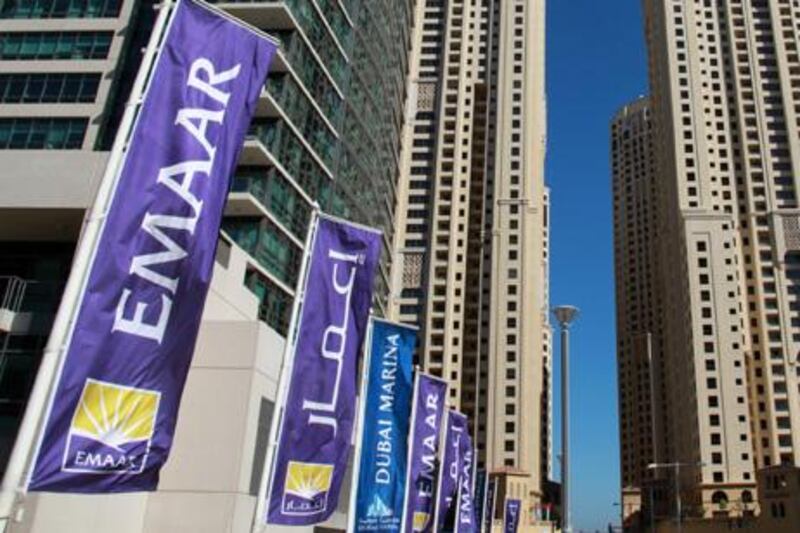Emaar Properties is working to convince lending banks to halve its borrowing costs on Dh3.6 billion of loans backed by its flagship Dubai Mall.
It is among several of Dubai’s government-related entities that are requesting banks to lower the levels of interest paid on some Dh18bn of loans, as a rebounding economy and falling risk perceptions helps the emirate’s corporate sector to tap cheaper capital.
Dubai Duty Free and Nakheel are other companies that have sought to lower the rate they pay on syndicated loans before an expected rise in US interest rates in the medium term lifts overall borrowing costs, a result of the dirham being pegged to the dollar.
Some of the UAE’s biggest banks are warning that their profits could fall as a result.
Emaar has approached lenders to lower the margin paid over London Interbank Offered Rates (Libor) on Dh3.6bn of loans maturing in 2016 and 2019 and secured by the Dubai Mall.
“Emaar has requested our banking partners to review the terms of the Dh3.6bn loan made in December 2011,” the company said. “Backed by such strong financial fundamentals and reflecting its contribution to the robust growth of the Dubai economy,
Emaar has been upgraded by rating agencies. The improvement in ratings has resulted in reduced borrowing rates,” it told The National.
Ahmad Alanani, the senior executive officer at Exotix, a specialist investor in illiquid debt, said: “The market understands that Emaar has sent a consent solicitation to their banks asking to cut the margins on their facilities to 175 basis points from the current 350 basis points.”
Bond market volatility has cut off many local firms from what had been a cheap source of funding. However, some companies have already been successful in their efforts to reduce borrowing costs. Dubai Duty Free repriced a $1.75bn debt facility earlier this month.
“The repricing was very well received by the market with strong support from its existing syndicate of international, regional and local banks, with several institutions also offering to increase their commitments as well as accepting the lower pricing,” the company said. Terms of the deal were not disclosed.
Meanwhile, Nakheel's chairman Ali Lootah said this week the developer was in "serious discussions" with local and international banks to extend the maturity on a Dh8bn loan coming due in 2015 and secure better terms. The three companies' loans under discussion are worth a total of Dh18bn.
Jebel Ali Free Zone Authority is also expected to pay a lower borrowing rate on $1.2bn in loans maturing in 2020 as part of the terms of its sale of Gazeley, a logistics warehouse developer subsidiary, according to a recent sukuk prospectus.
The rush to refinance comes after a reappraisal of Dubai’s economic vitality that has accompanied the emirate’s recovery from one of the world’s deepest property crashes.
Dubai’s five-year credit default swaps, which insure the emirate’s Government debts against missed payments, have fallen 136 basis points during the past year.
Emaar also has a $500m sukuk which comes due in August 2016, that was issued the same year as the Dh3.6bn loan.
It was “very difficult to raise capital at that time”, said one banker, who asked not to be identified.
The Islamic bond, which carried a coupon of 8.5 per cent in 2011, currently trades with a yield of 3.9 per cent, which is indicative of what the company could pay to borrow from credit markets today. Bond yields move in the opposite direction from price.
A bond sell-off during May and June may deter many companies from tapping credit markets during the months ahead, Abdul Kadir Hussain, the chief executive of Mashreq Capital, said in an interview this week.
Syndicated loan markets are expected to be easier to tap, with banks’ balance sheets now shorn of bad debts from the global financial crisis.
However, banks’ willingness to accept lower lending margins will be critical, especially with the aggressive pricing being sought by Emaar, analysts said.
Net interest margins on loans to the biggest Dubai-based companies and institutions were expected to fall in the coming months, Alex Thursby, the chief executive of National Bank of Abu Dhabi, said on a conference call on Wednesday.
“We’re starting to see that pressure coming through,” he said. “But we’re not seeing that margin compression in Abu Dhabi at this stage, and our Abu Dhabi book is considerably bigger than our Dubai book.”
Emirates NBD, the Dubai-based lender that is the UAE’s biggest bank, said net interest income rose 16 per cent during the quarter, though it warned that interest margins were higher than it had expected and could correct in the coming quarters.





